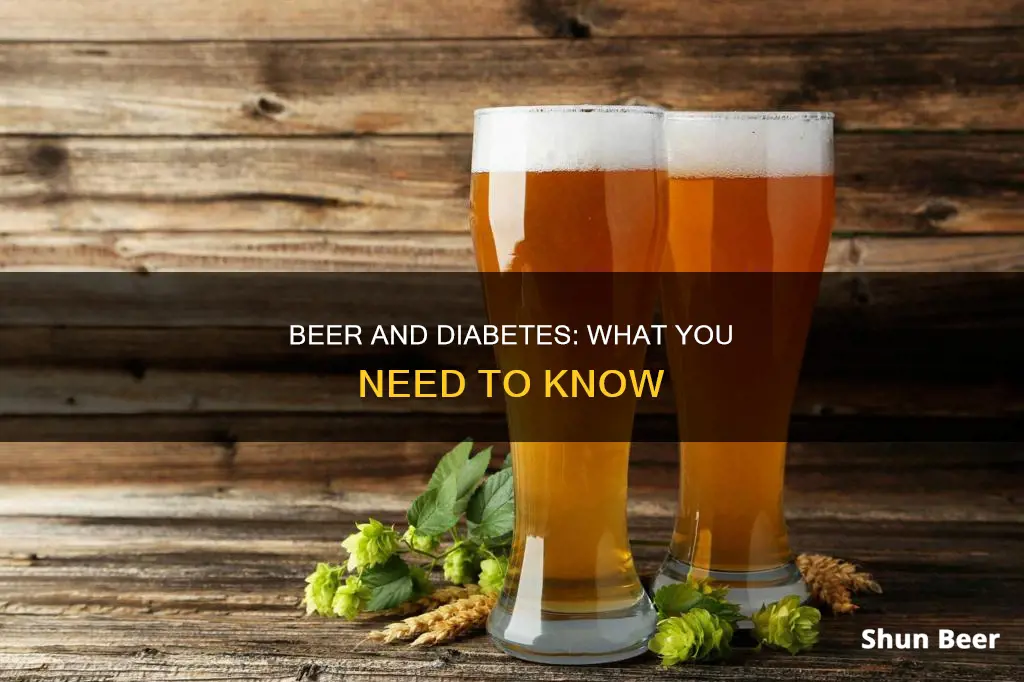
Drinking alcohol can have a significant impact on people with diabetes, and those with diabetes should be aware of how it can affect their body and how to manage this. Alcohol can cause blood sugar levels to drop to dangerous levels, and drinking on an empty stomach further increases this risk. Alcoholic drinks are often high in calories, which can lead to weight gain—a risk factor for diabetes. For those with diabetes, heavy drinking can also increase the risk of heart disease, nerve damage, and eye problems. It is recommended that people with diabetes drink in moderation and only when their blood sugar levels are well-managed.
What You'll Learn

How does beer affect blood sugar levels?
Drinking beer can affect blood sugar levels in several ways. Beer, like other alcoholic drinks, can cause blood sugar levels to drop, especially if you haven't eaten enough. On the other hand, if you've consumed a lot of alcohol and had a big meal, your blood sugar levels can rise too high.
The liver is the organ that regulates blood sugar levels by storing and releasing glucose (sugar) into the bloodstream. It also breaks down toxins like alcohol, which can disrupt its ability to regulate blood sugar. When you drink alcohol, the liver prioritises breaking down alcohol, which interferes with its ability to release glucose, leading to a potential drop in blood sugar levels. This is more likely to occur when drinking on an empty stomach, and the risk increases with each additional drink.
For people with diabetes, drinking beer can make controlling blood sugar levels more challenging. Those with diabetes who drink and are well-fed may experience high blood sugar levels, while those who are undernourished may develop dangerously low blood sugar levels. Alcohol can also increase the risk of weight gain, as alcoholic drinks are often high in calories, which can contribute to diabetes risk factors.
Additionally, alcohol may reduce the effectiveness of diabetes medications. It can interfere with the positive effects of oral diabetes medications or insulin by disrupting the liver's ability to turn proteins and fats into carbohydrates, which is crucial for energy regulation during exercise or between meals.
It's important to note that the effects of beer on blood sugar levels can vary depending on the individual's nutritional state, the amount of alcohol consumed, and other factors. Moderate alcohol consumption may offer some protection against type 2 diabetes, especially in women and Asian populations, while heavy drinking increases the risk.
Beer and Tamiflu: Is It Safe to Drink?
You may want to see also

How does beer affect weight gain?
Alcoholic drinks tend to be high in calories, and drinking them can affect your judgment, stimulating your appetite and causing you to overeat. This can lead to weight gain, which is a risk factor for developing type 2 diabetes.
Beer and sweet wines, for example, can be high in carbohydrates, which can cause a temporary rise in blood sugar levels. Drinking too much alcohol can also increase the level of fat in the blood (triglycerides) and raise blood pressure.
The calories in alcoholic drinks can add up quickly, making it difficult to lose excess weight. Alcoholic drinks can contain a lot of calories, with one pint of lager being equivalent to a slice of pizza. This can cause weight gain, which increases the risk of developing type 2 diabetes.
Drinking alcohol can also affect your body's ability to regulate blood sugar. If you drink without eating, your blood sugar may drop too low. On the other hand, if you drink after a large meal, your blood sugar may rise too high.
Alcohol stimulates your appetite and can affect your judgment, leading to overeating and disrupting your blood sugar control. This can make it more difficult to manage your weight and may contribute to weight gain.
Overall, drinking beer and other alcoholic beverages can affect weight gain by increasing calorie intake, disrupting blood sugar control, and stimulating appetite. These factors can contribute to weight gain, which is a risk factor for type 2 diabetes.
Warm Beer: To Drink or Not?
You may want to see also

How does beer affect diabetes medication?
Drinking beer or any other alcoholic drink can affect diabetes medication in several ways. Firstly, alcohol can interfere with the liver's ability to regulate blood sugar levels. Normally, the liver stores and releases glucose (sugar) into the bloodstream to maintain stable blood sugar levels. However, when you consume alcohol, the liver prioritises breaking it down over releasing glucose, leading to potential drops in blood sugar levels. This effect is more pronounced when drinking on an empty stomach, as the liver has no incoming carbohydrates to convert and release as glucose.
Secondly, alcohol can increase the risk of hypoglycaemia, or low blood sugar, which is particularly dangerous for people with diabetes. Certain diabetes medications, such as insulin and sulfonylureas, can already increase the likelihood of hypoglycaemia, and consuming alcohol in conjunction with these medications can further elevate this risk. Hypoglycaemia can cause symptoms such as dizziness, hunger, sweating, and trembling, which may be difficult to distinguish from the effects of alcohol or drunkenness. Therefore, drinking alcohol while taking diabetes medication requires careful monitoring of blood sugar levels and potentially adjusting medication dosages accordingly.
Thirdly, alcohol may promote weight gain due to its high calorie content and its ability to stimulate appetite and impair judgement, leading to potential overeating. Weight gain is a risk factor for developing type 2 diabetes and can further complicate blood sugar management in those who already have diabetes.
Additionally, alcohol consumption can lead to increased triglyceride levels (fat in the blood) and elevated blood pressure, which are detrimental to overall health, particularly for individuals with diabetes.
It is important to note that the effects of alcohol on diabetes medication vary depending on the type and amount of alcohol consumed, the nutritional state of the individual, and other individual factors. Moderate alcohol consumption may not significantly impact diabetes medication, but heavy drinking can have more pronounced effects and increase the risk of diabetes-related complications. As always, it is advisable to consult a doctor or healthcare professional for personalised advice regarding alcohol consumption and diabetes medication.
Beer and Teeth Whitening: What You Should Know
You may want to see also

What are the physical impacts of drinking beer with diabetes?
Drinking beer, or any alcoholic drink, can have several physical impacts on people with diabetes. Firstly, alcohol can affect blood sugar levels, causing them to drop too low, a condition known as hypoglycaemia or a 'hypo'. This can lead to symptoms such as dizziness, hunger, sweating, trembling, difficulty concentrating, and changes in mood and can even result in seizures or loss of consciousness if left untreated. Alcohol interferes with the liver's ability to regulate blood sugar levels, particularly when consumed on an empty stomach, and this effect is compounded when combined with diabetes medication. Therefore, drinking can increase the risk of hypoglycaemia for people with diabetes, and they may need to carry hypo treatments and wear medical ID to identify their condition.
Secondly, alcoholic drinks are often high in calories and carbohydrates, which can contribute to weight gain. This is a particular concern for people with diabetes as being overweight or obese is a risk factor for developing type 2 diabetes. Alcohol can also hinder blood sugar control by increasing triglyceride levels (fat in the blood) and blood pressure.
Thirdly, alcohol can worsen the symptoms of diabetes-related complications such as nerve damage (diabetic neuropathy) and eye damage (diabetic retinopathy). Diabetic neuropathy can cause burning and tingling sensations in the hands and feet, while diabetic retinopathy can lead to blindness.
Finally, excessive alcohol consumption can increase the risk of developing type 2 diabetes in the first place. Regular heavy drinking can reduce the body's sensitivity to insulin and trigger type 2 diabetes. Additionally, chronic pancreatitis, which may be caused by heavy drinking, can lead to diabetes. Therefore, it is important for people with diabetes to monitor their alcohol intake and follow guidelines for low-risk drinking.
Ireland's Beer Temperature: Why Room Temperature?
You may want to see also

What are the recommended limits for drinking beer with diabetes?
Beer is not entirely off-limits for people with diabetes. However, it is important to be aware of the recommended limits and safety considerations when drinking beer if you have diabetes. Here are some guidelines and suggestions to help you make informed choices:
UK Guidelines
According to UK Chief Medical Officers' (CMO) low-risk drinking guidelines, it is recommended to not regularly drink more than 14 units of alcohol per week. Binge drinking, or heavy drinking, should be avoided, especially if you have diabetes, as it can further increase the risk of developing type 2 diabetes and cause other health complications.
US Guidelines
In the United States, the recommended limits for alcohol consumption are generally the same for people with diabetes as for the general population. The American Diabetes Association (ADA) suggests that women limit their alcohol intake to no more than one drink per day, while men can consume up to two drinks per day. "Binge drinking" is strongly discouraged for both health and safety reasons. One drink is typically defined as 12 ounces of beer, a 5-ounce glass of wine, or a 1.5-ounce shot of liquor.
Additional Considerations
- Drink with food: It is advisable to consume alcohol with food, preferably including some carbohydrates. This helps prevent hypoglycemia, as alcohol interferes with your blood sugar levels and can make them drop. Eating also reduces the risk of weight gain associated with the calories in alcoholic drinks.
- Monitor blood sugar levels: Keep a close watch on your blood sugar levels before, during, and after drinking. This is especially important if you are taking diabetes medications, as alcohol can affect their effectiveness and further impact your blood sugar control.
- Stay hydrated: Drink plenty of water along with your beer to maintain hydration.
- Choose lower-carb options: Opt for "light" beers, dry wines, or spirits mixed with low-calorie options such as water or club soda. These options tend to have fewer carbohydrates and lower alcohol content.
- Pace yourself: If you plan to drink over several hours, such as during a sporting event, limit yourself to no more than one drink per hour and no more than three to four drinks total for the day.
- Be mindful of symptoms: Be aware of the symptoms of hypoglycemia, such as dizziness, increased heart rate, or slurred speech. These symptoms can sometimes be confused with or masked by the effects of alcohol.
- Medical advice: Discuss your alcohol consumption with your doctor or healthcare team. They can provide personalised advice based on your specific health needs and any medications you are taking.
Exploring the Limits: 50 IPAs, a Safe Challenge?
You may want to see also
Frequently asked questions
The main concern is that alcohol can cause your blood sugar to drop very low — below 70 mg/dL — which is known as hypoglycemia.
Alcoholic drinks often contain a lot of calories, which can cause weight gain. Alcohol may also reduce the effectiveness of diabetes medications.
When blood sugar levels drop below 70 mg/dL, it can cause headaches, irregular heartbeat, anxiety, and confusion. If levels are low enough, it may even cause seizures.
It's recommended that you talk to your doctor first. They can advise you on whether alcohol might interfere with your medications or cause other health issues.







